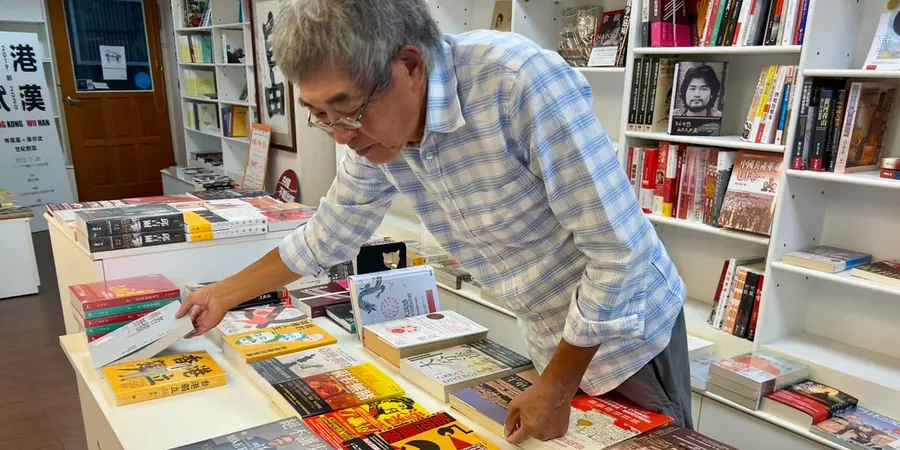
From Solitary Confinement to Empowering Change: A Hong Kong Bookstore Owner's Unyielding Stand for Free Press in Taiwan
2024-10-15
Author: Lok
From Solitary Confinement to Empowering Change: A Hong Kong Bookstore Owner's Unyielding Stand for Free Press in Taiwan
In a bold move emblematic of the struggle for freedom, Lam Wing-kee, the custodian of Causeway Bay Books, relocated his renowned bookstore from Hong Kong to Taipei. Famous for its selection of books that critique the Chinese Communist Party, the bookshop now sits in a more affordable area in Taiwan, yet faces the harsh realities of slow sales.
"Each month, I face financial losses," the 68-year-old Lam mournfully admitted in Mandarin, seated in his bookstore adorned with anti-government memorabilia, having transformed part of the space into his living quarters.
A Reputable Past in Hong Kong
The original Causeway Bay Books made its mark in Hong Kong for two decades, attracting many visitors, including mainland tourists eager to access literature banned by Chinese authorities. However, in 2015, the bookstore was shuttered following alarming disappearances of its staff, who were kidnapped by the mainland government for selling prohibited works. Lam himself endured five months of solitary confinement, ultimately forced to confess to illegal book trading—an ordeal he described as relentless brainwashing.
A New Chapter in Taiwan
After fleeing to Taiwan during the tumultuous unrest sparked by a proposed extradition bill in 2019, Lam reopened his bookstore the following year. Funded by generous donations, Causeway Bay Books has since evolved into a sanctuary for dialogues on democracy, a nexus for Hongkongers yearning for a semblance of their former lives. Despite the dwindling number of customers, Lam considers the bookstore a torchbearer for freedom of speech amid increasing military presence and political tensions in the region.
"Independent bookstore owners aren't in it for profit; they strive for ideals," noted Ben Cheng, an associate professor from Fo Guang University.
More Than Just a Bookstore
While visiting, it was disheartening to witness the store’s struggle for customers. Regulars have grown cautious about buying books for fear of repercussions upon returning to Hong Kong. Lam contemplated closing shop, but his friends reminded him the store serves a greater purpose.
“I won’t close without a fight,” he stated defiantly, recalling a successful donation campaign that raised 6 million New Taiwan Dollars. He has since reopened in central Taipei, aiming to attract more patrons in a smaller space.
A Broader Struggle for Independent Bookstores
Unlike the fate of other independent bookstores in Hong Kong, which face escalating government scrutiny—including threats of closure—Causeway Bay Books persists as a bastion of literary freedom. Following the implementation of national security laws, conditions in Hong Kong have grown perilous for free press, with reports indicating a rise in censorship. Yet, the number of independent bookstores has surprisingly grown—86 were counted by 2022 compared to fewer than 50 just three years prior.
Ben Cheng, who studied independent bookstores, emphasizes their vital role as alternative sources of information, remarking that the disappearance of such bookstores would signify a complete eradication of free speech.
Towards a Vision of Freedom in Taiwan
For Lam, the decision to remain in Taiwan is underscored by an appreciation for the democratic freedoms available here. While he acknowledges a longing for his homeland, he firmly believes Hong Kong can no longer be classified as a free society, dubbing it "Chinese Hong Kong."
Despite anticipating the struggle for independence may not manifest in his lifetime, Lam remains resolute in his mission: to nurture critical thinking among readers. "We can't change China, so we must protect Taiwan," he asserts, hopeful for a future where the island remains an emblem of democracy amid escalating pressures from Beijing.
As tensions grow, Lam exemplifies the relentless commitment to free press and thought—a mission looming larger than profits, one that reverberates in the heart of Taiwan.





 Brasil (PT)
Brasil (PT)
 Canada (EN)
Canada (EN)
 Chile (ES)
Chile (ES)
 España (ES)
España (ES)
 France (FR)
France (FR)
 Hong Kong (EN)
Hong Kong (EN)
 Italia (IT)
Italia (IT)
 日本 (JA)
日本 (JA)
 Magyarország (HU)
Magyarország (HU)
 Norge (NO)
Norge (NO)
 Polska (PL)
Polska (PL)
 Schweiz (DE)
Schweiz (DE)
 Singapore (EN)
Singapore (EN)
 Sverige (SV)
Sverige (SV)
 Suomi (FI)
Suomi (FI)
 Türkiye (TR)
Türkiye (TR)